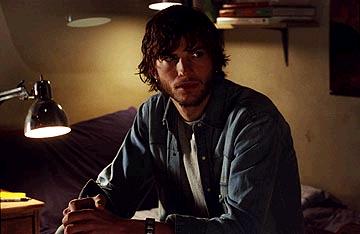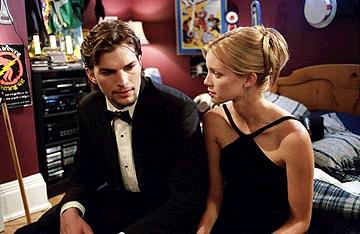

There comes a time in the life of every actor when he/she must prove that there is something behind a pretty face. For Charlize Theron, this film was Monster, where she proved beyond a doubt that she could be a powerful actress. Ashton Kutcher wants The Butterfly Effect to be his movie. Kutcher (Cheaper by the Dozen, My Boss's Daughter) is a frequent star of many lesser comedic vehicles, and this is his most serious outing to date. Eric Bress and J. Mackye Gruber (Final Destination 2), who co-wrote and co-directed the film, were initially against Kutcher starring, until he somehow convinced him. In the final cut, Kutcher has a producer credit. How does he do? Not very well. Not too bad though. Kutcher does not come across as Evan Treborn, just as Ashton Kutcher. His personal life has taken somewhat of an upward spiral lately, so he is nearing the point of overexposure. Kutcher the tv star/goofball never manages to become Evan, pysch student who wants to fight for his girl.
The Butterfly Effect takes its name from the seminal example of chaos theory, that a butterfly flapping its wings may cause a hurricane halfway across the world. In other words, complex systems can be unpredictable. But far from coming for a lesson in mathematics, Bress and Mackye wanted to create a densely plotted thriller dealing with time travel. To put the plot in context with the example, changing one event in the past can have humongous consequences in the future. As a child, Evan, among other things, suffered a series of blackouts. His doctor told him to keep journals of all his activities, perhaps spurring memories of what happened during his blackouts. Now in college, Evan discovers that by focusing on his journals, he can go back into the past and change it.
Evan goes back into the past to save his childhood sweetheart Kayleigh (Amy Smart, The Battle of Shaker Heights, Scotland, PA), who commits suicide. Evan revisits child pornography, animal abuse, and a childhood prank gone wrong as he tries to right various wrongs. However, he finds that every time he makes one change, other unforeseen things happen, forcing him to go back and make more changes. He goes from star psych student to frat boy, to murderer, and an armless bitter man. Smart gets it worse, as she goes as high as a sorority girl and as low as a hooker. Bress and Mackye simply take things too far. Their script does make sense, and is reminiscent of Donnie Darko, a film with similar films done much better. Here, the duo insists on making everything extreme and taking things too far. By going all the way instead of restraining themselves, they turn all serious and contemplative moments in The Butterfly Effect into laughs.
Oddly enough, it is Elden Henson (The Battle of Shaker Heights, Dumb and Dumberer) who emerges as a convincing dramatic actor. Henson, because of his stocky build and his looks, usually is some sort of bully in his films. This is one of the first times he is not. He has a chance to play a normal college kid and a bitter institutionalized teen, and, unlike Kutcher, he pulls it off. Unfortunately for both of them, both their characters are in dire need of a good haircut. The other characters fall victim to Bress and Mackye's overindulgence in all things. Ethan Suplee (Cold Mountain, John Q.) is a sometime Goth roommate of Evan, and William Lee Scott (Dumb and Dumberer, Identity) is Kayleigh's psychotic brother. The only other actor to come off relatively unscathed is John Patrick Amedori (Unbreakable), who plays Evan at 13. Amedori has to deal with all sorts of things happening around him that he has no memory of. It's pretty sad when, out of two actors playing the same person (albeit at different ages), the one with much less experience and no expectations does a better job than the star, who wants his credibility to hinge on this film.